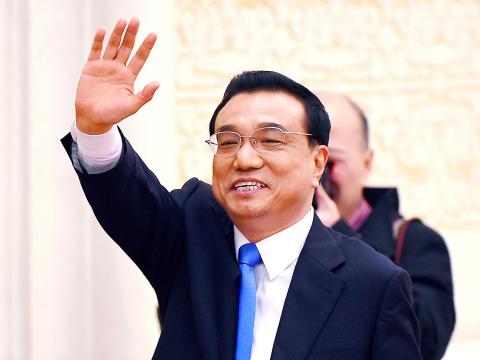At a news conference after the closing of China’s annual National People’s Congress legislative session in Beijing yesterday, Chinese Premier Li Keqiang (李克強) promised that China would prioritize Taiwan as Beijing opens to the world, and that it would continue to protect the interests of Taiwanese businesses in China.
“We will continue to protect the legitimate rights and interests of Taiwan-funded enterprises and Taiwan businesspeople on the mainland, and provide proper preferential policies to them,” Li said, when asked to comment on problems that Taiwanese businesses encounter in China.
To enhance cross-strait economic cooperation, Li said that “two wheels should be put in motion.”

Photo: AFP
“One is to enhance institution-building, for example, to continue to pursue follow-up talks on the Economic Cooperation Framework Agreement, and the other wheel is about further mutual opening-up,” he said.
However, Li said that such economic cooperation should be built on political foundations.
“People on both sides of the Taiwan Strait are members of one big family, as long as we continue to adhere to the ‘one China’ principle and the ‘1992 consensus,’ to oppose the Taiwan independence movement, and uphold peaceful development for cross-strait relations,” the premier said.
The so-called “1992 consensus,” a term former Mainland Affairs Council chairman Su Chi (蘇起) admitted he had fabricated in 2000, refers to a tacit understanding between the Chinese Nationalist Party (KMT) and Beijing that both sides of the Taiwan Strait acknowledge there is “one China,” with each side having its own interpretation.
Li also extended his invitation to young Taiwanese — who have drawn Beijing’s attention since the Sunflower movement last year — to start businesses in China.
“We welcome people from Taiwan businesses, particularly young people, to pursue their careers in the mainland, and enhance personnel exchanges,” Li said, which would help to “bring the hearts and minds of people on both sides of the Strait even closer to each other.”
The Mainland Affairs Council released a statement in response to Li’s remarks.
“The ‘1992 consensus,’ which allows both sides of the Taiwan Strait to make its own interpretation on ‘one China,’ is the foundation for institutionalized cross-strait interactions and exchanges,” the council said. “We call on China to face reality in cross-strait relations, fully understand Taiwanese people’s views and push for realistic, peaceful and stable developments between the two sides of the Taiwan Strait.”
The council also recognized China’s recent reform efforts, adding that it expects China to show its determination about the reforms — while allowing citizens to participate — to enhance life for people on both sides of the Strait, it added.

NATIONAL SECURITY THREAT: An official said that Guan Guan’s comments had gone beyond the threshold of free speech, as she advocated for the destruction of the ROC China-born media influencer Guan Guan’s (關關) residency permit has been revoked for repeatedly posting pro-China content that threatens national security, the National Immigration Agency said yesterday. Guan Guan has said many controversial things in her videos posted to Douyin (抖音), including “the red flag will soon be painted all over Taiwan” and “Taiwan is an inseparable part of China,” while expressing hope for expedited “reunification.” The agency received multiple reports alleging that Guan Guan had advocated for armed reunification last year. After investigating, the agency last month issued a notice requiring her to appear and account for her actions. Guan Guan appeared as required,

A strong cold air mass is expected to arrive tonight, bringing a change in weather and a drop in temperature, the Central Weather Administration (CWA) said. The coldest time would be early on Thursday morning, with temperatures in some areas dipping as low as 8°C, it said. Daytime highs yesterday were 22°C to 24°C in northern and eastern Taiwan, and about 25°C to 28°C in the central and southern regions, it said. However, nighttime lows would dip to about 15°C to 16°C in central and northern Taiwan as well as the northeast, and 17°C to 19°C elsewhere, it said. Tropical Storm Nokaen, currently

‘NATO-PLUS’: ‘Our strategic partners in the Indo-Pacific are facing increasing aggression by the Chinese Communist Party,’ US Representative Rob Wittman said The US House of Representatives on Monday released its version of the Consolidated Appropriations Act, which includes US$1.15 billion to support security cooperation with Taiwan. The omnibus act, covering US$1.2 trillion of spending, allocates US$1 billion for the Taiwan Security Cooperation Initiative, as well as US$150 million for the replacement of defense articles and reimbursement of defense services provided to Taiwan. The fund allocations were based on the US National Defense Authorization Act for fiscal 2026 that was passed by the US Congress last month and authorized up to US$1 billion to the US Defense Security Cooperation Agency in support of the

PAPERS, PLEASE: The gang exploited the high value of the passports, selling them at inflated prices to Chinese buyers, who would treat them as ‘invisibility cloaks’ The Yilan District Court has handed four members of a syndicate prison terms ranging from one year and two months to two years and two months for their involvement in a scheme to purchase Taiwanese passports and resell them abroad at a massive markup. A Chinese human smuggling syndicate purchased Taiwanese passports through local criminal networks, exploiting the passports’ visa-free travel privileges to turn a profit of more than 20 times the original price, the court said. Such criminal organizations enable people to impersonate Taiwanese when entering and exiting Taiwan and other countries, undermining social order and the credibility of the nation’s